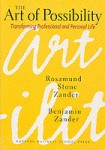 I have just finished reading The Art of Possibility by Rosamund S. Zander and Benjamin Zander (link to Amazon’s page about it). Helena’s mother had given it to me to read after some interesting debates about management and leadership a few months ago. The book offers a series of Practices such as It’s All Invented, Rule Number 6, Giving Way to Passion etc., with the aim of managing to make humans think in constructive and open ways, ready to reap the benefits of possibility rather than see scarcity and doubt at every turn.
I have just finished reading The Art of Possibility by Rosamund S. Zander and Benjamin Zander (link to Amazon’s page about it). Helena’s mother had given it to me to read after some interesting debates about management and leadership a few months ago. The book offers a series of Practices such as It’s All Invented, Rule Number 6, Giving Way to Passion etc., with the aim of managing to make humans think in constructive and open ways, ready to reap the benefits of possibility rather than see scarcity and doubt at every turn.
This all very well, and certain parts of the book are very interesting. I was particularly intrigued by some passages about corporate visions. It gave a different take on the Home Office‘s vision of Building A Safe, Just and Tolerant Society – it’s an excellent vision as such, but the truth is simply so far from the vision. There are other aspects of the book that are relevant to my own career situation too. What is my vision for what I should be doing? How do all the complexities I face on an everyday basis come to be on this board? There’s an element of self-fulfilling prophecy about the entire thing – the sorts of people reading the book are probably the people who are already reflecting about the need to be more positive, creative, and open to possibility!
And then there is the other side of the book: a somewhat nauseating degree of anecdote of life-changing experiences, many of them linked to Benjamin Zander’s career as a conductor. Firstly, I am not especially musical and cannot quite relate to some of his examples. Second, I am not sure I have ever (or am ever) going to me moved by things to such a passionate degree as the authors are in some of the things that have happened in their lives. This leaves the book towing a fine line between constructive and positive suggestions, and the need for a leap of faith to jump into a land of passion and endless possibility.
I’m all for coming up with new ideas to help structure our thoughts, find better ways to do things etc. – my fascination with the Myers-Briggs Type Indicator is testimony to that. But for me this book was just a bit over-the-top.







